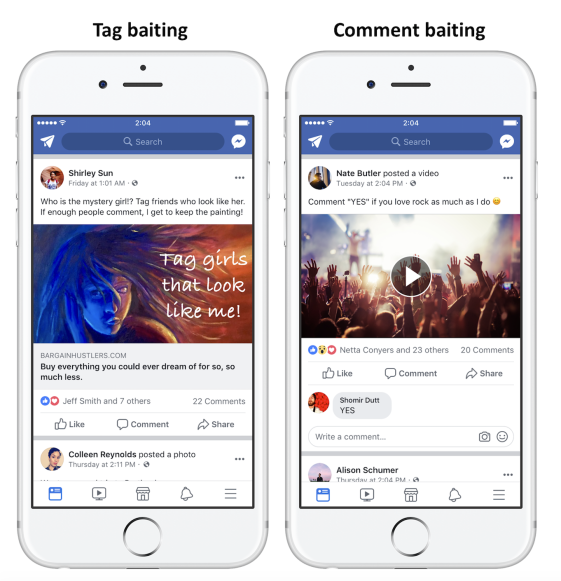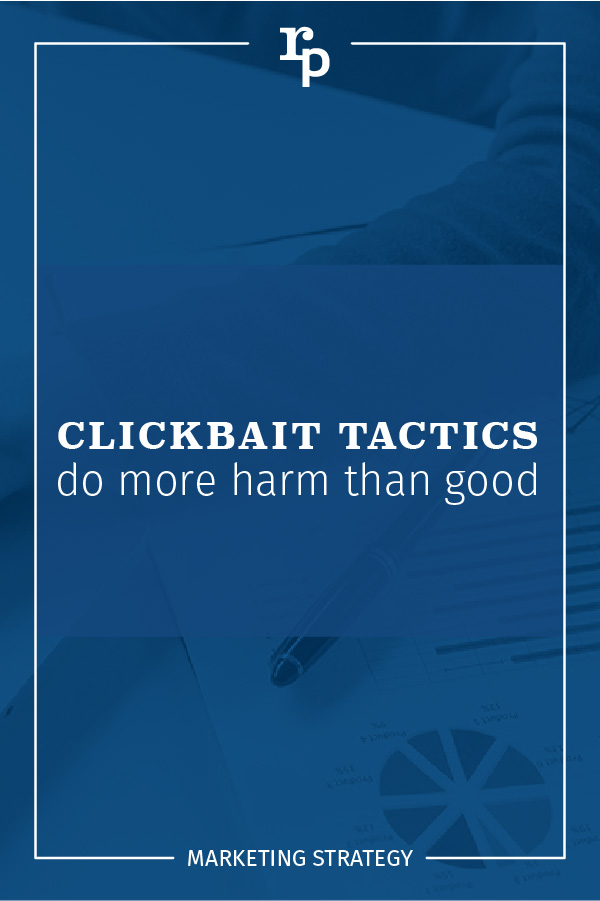Clickbait – Drives Prospects Away
These 12 Insanely Inspirational Acts of Kindness Will Restore Your Faith In Humanity! (If You Don’t Cry at #6 You Don’t Have A Soul)
As a former journalist and current blogger, these kinds of clickbait headlines make me nauseous. Like seriously, it is such a low-brow and obvious tactic for getting clicks to an article or landing page. Who would ever in their right mind be duped into a click on such an obvious ploy?
Unfortunately, the answer is a lot of people, myself included. I’ll admit that headlines like this will occasionally elicit a response from me as well. I would venture a guess that anyone reading this has fallen prey to a similar headline. As stupid and obvious of a trick as it is, clickbait headlines and tactics (also known as engagement bait) work the majority of the time. What other reason would there be for these kinds of headlines to run rampant and sites like Buzzfeed to still almost exclusively rely on them?
However, every time I have clicked, I knew exactly what I was getting into. I knew the headline was going to be misleading. I knew the article wasn’t going to be of any substance or value. But I clicked anyway. Why? It’s the power of curiosity. That’s why people time and again click on these articles or why TV shows cut to commercial right before a drastic reveal (I’m looking at you, Chopped!). Our curiosity, as cliche as it sounds, will often get the best of us and make us stick around.
This intro may give you the impression that I’m going to turn around and encourage you to take advantage of people’s curiosity and use clickbait headlines and tactics to your advantage. Thankfully, that isn’t the case. It’s true that this tactic may initially increase web traffic. However, aside from being a deplorably deceiving tactic, clickbait headlines and engagement bait behavior can actually cripple your website and kill your social media presence in the long run.
These 3 Surprising Facts About Clickbait Articles Will…
Nah, I’m just kidding.
Clickbait headlines create high bounce rates
Because of the grandiose approach to getting clicks, clickbait headlines set certain high expectations for visitors. In an age where consumers demand immediate satisfaction, this can be a dangerous game. If you tell me you are going to “blow my mind” I expect my mind to be blown and not just “hm, interesting.” If you tell me you are going to make me “laugh out loud” I expect to laugh out loud not just give one solitary huff of amusement.
Clickbait headlines, along with user expectations, need to give immediate and relevant satisfaction. If you disappoint, and you likely will because of internal expectations, visitors will leave your page immediately. The more and more this occurs, the higher that page’s bounce rate (how many visitors clicked back to Google after viewing just one page) will grow. A site littered with a library of pages with high bounce rates is a bad thing.
Google’s algorithm will help promote pages it deems to have quality content by improving its position on search rankings and punish those that it deems to not have quality content. Since bounce rates are due to people hitting your page and not feeling compelled to stick around, high bounce rates tell Google your site doesn’t have quality content. In this way, clickbait tactics will ultimately make Google bury your site in search results.
Automatic distrust and negative perception
Let’s face it, whatever sheen clickbait headlines once had has now completely worn off. They are basically a meme at this point, and not in a good way. There is an immediate association most people have with clickbait content of weariness. People have grown tired of being duped into reading stupid, misleading articles. The many sources still out there that regularly use and lean on clickbait tactics are typically mocked, scorned and, worst of all, distrusted.
One of the ultimate goals of blogging, especially for businesses, is to position yourself as an expert. To gain people’s trust so that they feel more comfortable, ultimately giving you their business. By relying on clickbait content, you are taking your own legs out from under you by positioning yourself in an unfavorable and untrustworthy fashion. Are a few extra clicks worth dirtying your reputation or the way your customers look at you?

Clickbait hurts on social media too
Have you seen junk like this in your timeline before? It’s annoying, right? While this isn’t exactly a clickbait headline, it is a clickbait tactic that personal and business brands alike use to artificially boost engagement with content, taking advantage of the Facebook algorithm that gave posts with lots of engagement better visibility.
Well, Facebook is trying it’s best to completely remove this kind of content from your timeline. Late last year Facebook introduced an algorithm change that would penalize this kind of content after years of negative user responses and complaints about this style. A “Page-level demotion system” is now set to push the content of serial abusers of these tactics lower and lower in timelines.
So, not only will relying on engagement bait hurt you on Google – it will hurt you on social media too.
You don’t need clickbait to drive traffic to your website. A dedication to creating quality content in your blog, a well-planned content calendar, effective social media advertising, and patience beat sleazy, clickbait headlines any day of the week.
want your blog posts to command attention?
Download our concise guide to the perfect headline.

Chatbot Basics 101
Favorite Social Media
What is your favorite social media platform? Remember the days when there was just Myspace? Oh,...
Call to Action Do’s and Don’ts
There is such a thing as a bad call to action The goal of any page on a website, whether it's the...
5 Ways to Engage Your Audience on Instagram
With over a billion active users worldwide, Instagram will never run out of fresh visual content....
